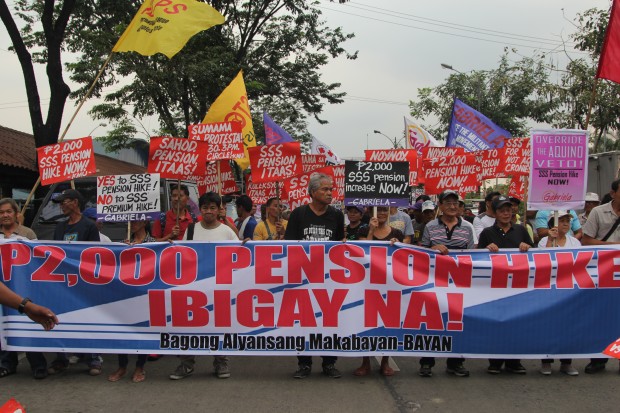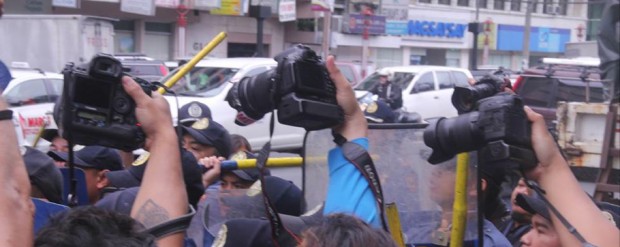STREETWISE: Digging deeper into the SSS pension hike by Carol Pagaduan-Araullo
Speaker Feliciano R. Belmonte, Jr. justified the abrupt adjournment of Congress last Wednesday by saying he didn’t want to embarrass President Benigno S. C. Aquino III with the prospect of a move to override the presidential veto on the SSS pension hike. Not that Rep. Neri J. Colmenares, who was leading the effort to get two thirds of the House of Representatives to sign his override resolution, already had the numbers. But Mr. Belmonte apparently was not confident he could muster the vote to defeat the resolution either.
The hurried adjournment in order to prevent even a debate and much more a vote was totally unjustified. There was a quorum, there was time. Not a few of the affected citizens were present to witness their representatives’ action in their behalf. But the house leadership went to the extent of turning off the microphone while Rep. Colmenares was in the middle of arguing for a discussion and vote.
These “people’s representatives” were caught in a dilemma.
To vote to override Aquino’s veto would likely mean reduced access to Malacanang’s largesse for the coming 2016 elections. To vote against the override, in effect to vote against the pension increase, would expose them as uncaring for the plight of SSS pensioners, spineless in the face of Malacanang pressure, and as the unprincipled, opportunist, and elitist bunch of bureaucrat capitalists they really were.
That is the rotten politics of it.
But what of the economics?
Is it true that the SSS pension bill was not well thought out, that the bill sponsors and the entire Congress merely wanted to pander to what is popular in the season of elections, that they took little regard of its supposed dire effect on the SSS fund life?
For the record, Colmenares filed the bill in 2011 and it passed through the gauntlet of the congressional mill until approved in 2015. SSS top brass had all the time and the opportunity to argue their opposition to the pension increase but they failed to convince Congress. Malacanang had the time, opportunity and clout over its congressional allies to kill the bill but it didn’t.
A 4-billion deficit per year was projected with a 56-billion peso additional cost to the fund. Fund life would be reduced to 13 years from 2015 if — a big if — nothing was done to improve collections, plug leaks, raise income on idle assets, and improve the performance of investible funds.
Worse comes to worst, the national government could appropriate the necessary funds to subsidize SSS expenses in accordance with the SSS Act of 1997. Even increasing member contributions could be considered once it has been demonstrated that SSS significantly improved its services and benefits.
The long and short of it is that the SSS can actually afford the pension hike. It is a matter of priorities; a matter of political will. Clearly the Aquino administration does not consider throwing a lifeline to 2.2 million elderly SSS members a priority. Neither does it have the political will to cut corruption, bureaucratic wastage and inefficiency in the SSS itself.
Talk about inclusive growth under the Aquino administration is a lot of hot air when SSS executives are given “performance” bonuses but its members cannot partake of the gains in its investment portfolio.
The good thing about the heated debate on the P2000-peso SSS pension hike is that many people, not just senior citizens, have begun to ask questions about what ails the country’s social security system, not just the SSS but also the GSIS, and what deep-going reforms are in order.
Progressive think-tank IBON Foundation has come up with very strong arguments backed by hard data to convince us that “social insecurity” actually hounds majority of Filipinos up until their twilight years.
For one, out of 7.8 million senior citizens, IBON estimates that at least two-thirds or over 5.1 million are poor. (IBON uses a poverty threshold of Php125 per day or Php3,800 monthly whereas the Philippine Statistics Authority officially uses an unrealistic poverty threshold of just Php52 per day or some Php1,582 monthly.)
Moreover, six out of ten (57%) elderly Filipinos, or some 4.5 million, don’t receive any pension at all.
If we include those who receive pensions below a reasonable poverty threshold, this would mean almost 97% of elderly Filipinos, or around 7.5 million, cannot afford to live decently much less be able to buy costly maintenance medicines for their various illnesses.
According to IBON, “Coverage is poor because the country’s main pension schemes are designed as an individualistic mechanism more than real social security. The SSS and GSIS are contributory schemes that only cover their members, whose membership depends on member contributions, and whose level of benefit depends on the level of member contributions…But the problems of basing pensions on regular work-based contributions in the Philippine context of so much joblessness and pervasive irregular and low-paying employment are clear.”
The unemployed will certainly not be able to make any significant contributions. But not even those employed are assured of becoming active and qualified SSS members. IBON estimates six out of ten of total employed (58%) are non-regular workers, agency-hired workers, or in the informal sector with at best erratic ability to pay contributions. The problem gets worse with the rising practice of contractualization wherein workers have no security of tenure and are simply hired and rehired every six months.
IBON concludes that the only way forward is for government “to confront Philippine underdevelopment realities head-on and aim for a non-contributory tax-financed universal social security system…(S)ociety, through the government, should be assuming primary responsibility for the security of its most vulnerable citizens including the elderly. Contributory member-financed schemes such as SSS and GSIS should just be complementary measures to a central scheme designed to reach the majority of Filipinos.”
Unfortunately, so long as the neoliberal economic doctrine has a stranglehold over the mindset of our country’s political leaders, government economic policies will continue to eschew this approach to overhauling the social security system.
The so-called “free market” means every man for himself; government intervention to promote social equity and social justice are anathema; even social safety nets for the most vulnerable in society are considered burdensome and unsustainable.
The struggles of senior citizens and their families for a meaningful increase in SSS pensions are giving them valuable lessons in life. Who are with them and who are against them and why. The nature of reactionary politics in an elite-dominated society such as Philippine society. And most important of all, that meaningful changes can only take place when the exploited and oppressed unite and take matters into their own hands.
Senior citizen power is also “people power”; once unleashed, it will find its mark. #
Published in Business World
8 February 2016


